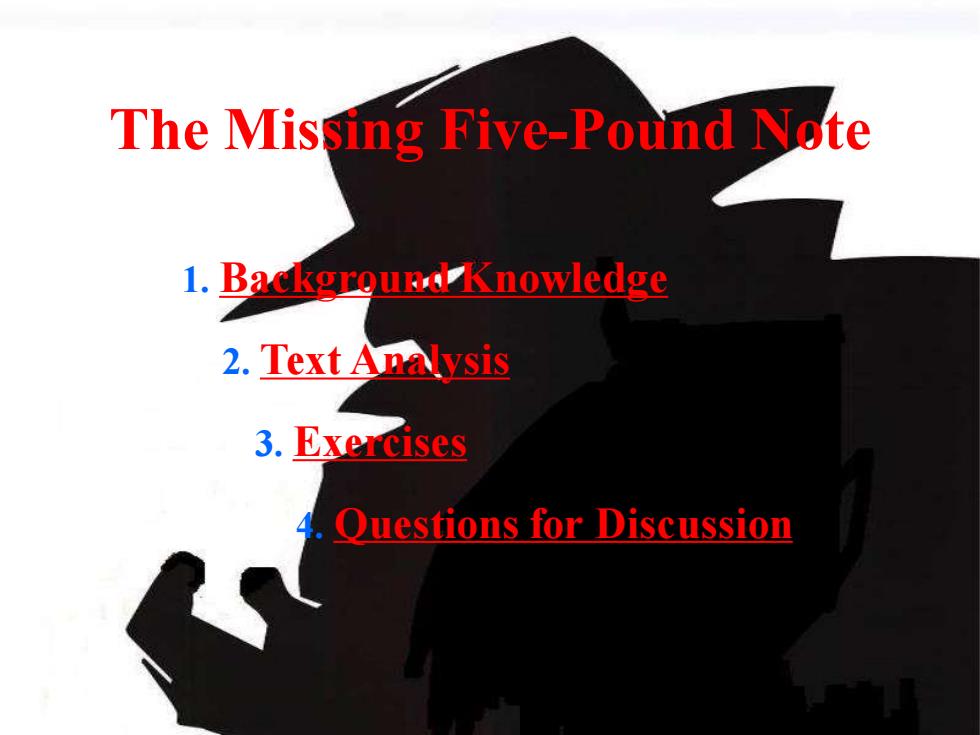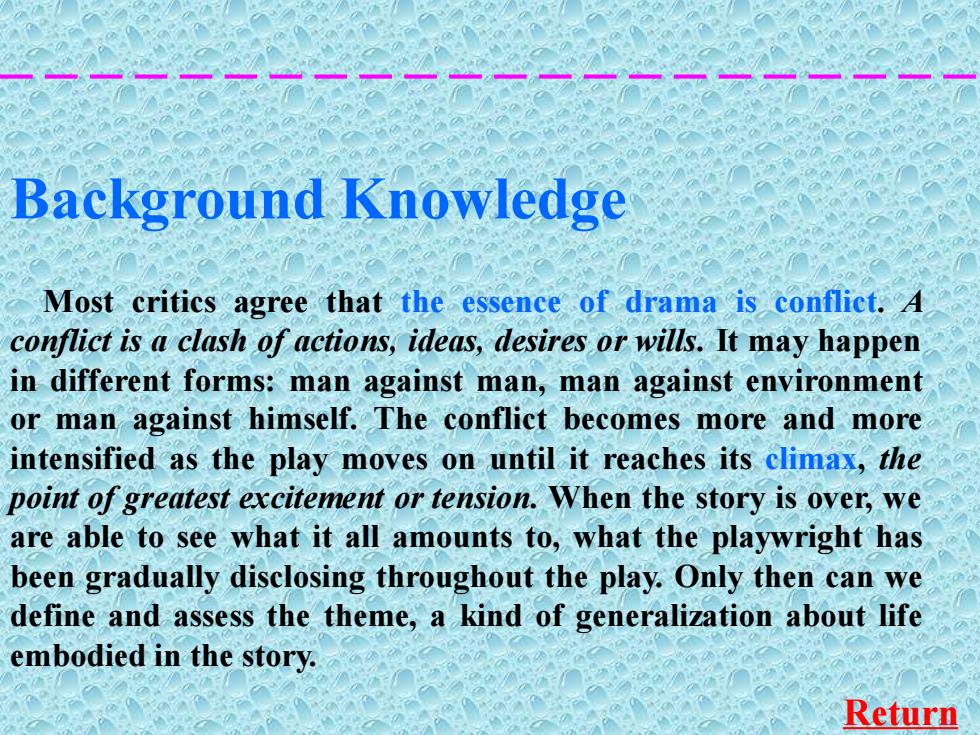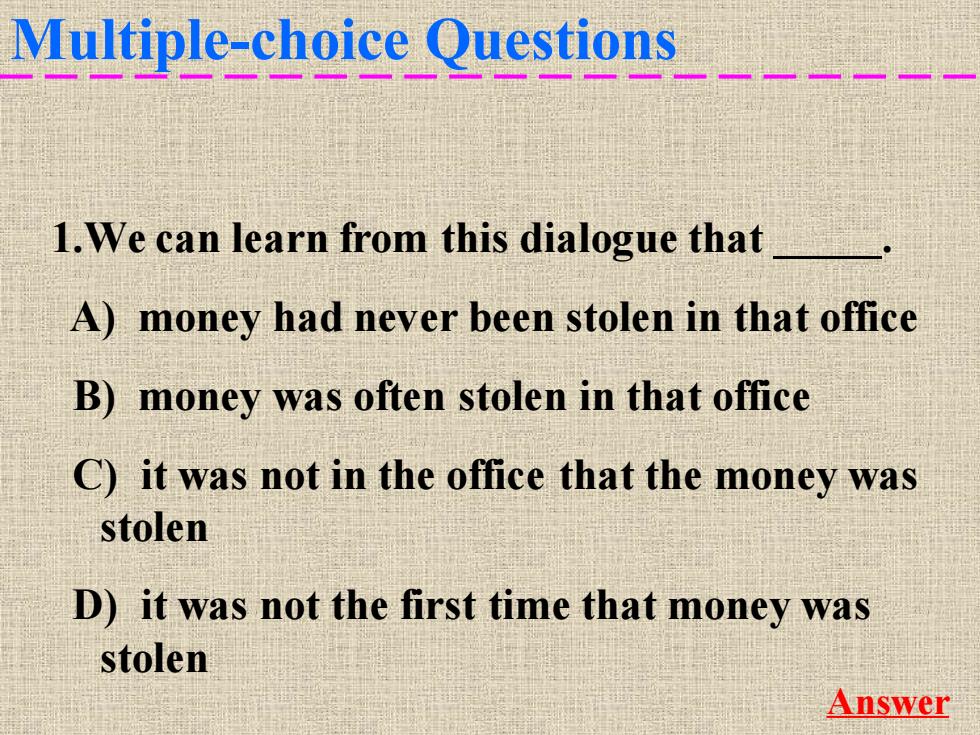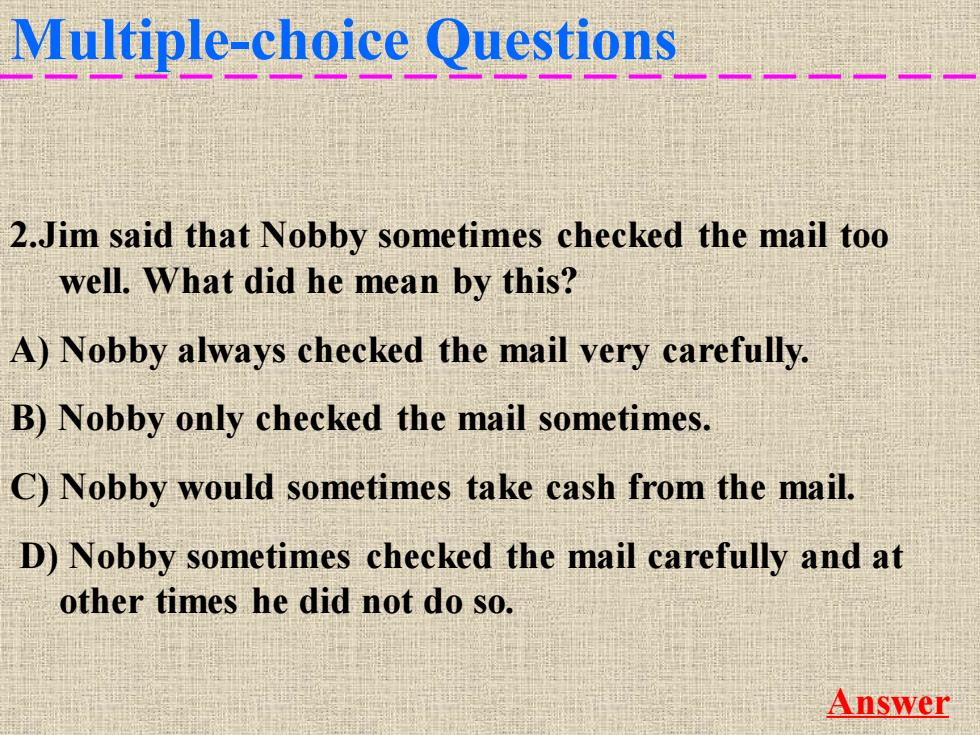
The Missing Five-Pound Note 1.Backgroun Knowledge 2.Text Analysis 3.Exercises Questions for Discussion
The Missing Five-Pound Note 1. Background Knowledge 2. Text Analysis 3. Exercises 4. Questions for Discussion

Background Knowledge The drama is one of several methods of telling a story. It differs from the novel in that the story is not told directly by the author but is acted on a stage by actors before an audience.Strictly speaking,a printed play is not a play at all until it is acted.So,in reading plays,we should visualize as well as we can the stage for which the play was written;that is,we must imagine seeing and hearing the characters in action. More
Background Knowledge The drama is one of several methods of telling a story. It differs from the novel in that the story is not told directly by the author but is acted on a stage by actors before an audience. Strictly speaking, a printed play is not a play at all until it is acted. So, in reading plays, we should visualize as well as we can the stage for which the play was written; that is, we must imagine seeing and hearing the characters in action. More

Background Knowledge The playwright has special restrictions not imposed on the novelist or short-story writer.He is restricted in time by the patience and endurance of the audience.He is restricted in space by the physical limitations of the stage and the kind of visual backgrounds the theater affords.One more restriction on the playwright is that he must keep himself out of the picture.He cannot,like some novelists or short-story writers,come forward, interrupt the action,and tell the audience what he means by a certain scene or explain to them what is going on in the minds of his characters.He cannot point out the moral;the play must explain itself. More
Background Knowledge The playwright has special restrictions not imposed on the novelist or short-story writer. He is restricted in time by the patience and endurance of the audience. He is restricted in space by the physical limitations of the stage and the kind of visual backgrounds the theater affords. One more restriction on the playwright is that he must keep himself out of the picture. He cannot, like some novelists or short-story writers, come forward, interrupt the action, and tell the audience what he means by a certain scene or explain to them what is going on in the minds of his characters. He cannot point out the moral; the play must explain itself. More

Background Knowledge Most critics agree that the essence of drama is conflict.4 conflict is a clash of actions,ideas,desires or wills.It may happen in different forms:man against man,man against environment or man against himself.The conflict becomes more and more intensified as the play moves on until it reaches its climax,the point of greatest excitement or tension.When the story is over,we are able to see what it all amounts to,what the playwright has been gradually disclosing throughout the play.Only then can we define and assess the theme,a kind of generalization about life embodied in the story. Return
Background Knowledge Most critics agree that the essence of drama is conflict. A conflict is a clash of actions, ideas, desires or wills. It may happen in different forms: man against man, man against environment or man against himself. The conflict becomes more and more intensified as the play moves on until it reaches its climax, the point of greatest excitement or tension. When the story is over, we are able to see what it all amounts to, what the playwright has been gradually disclosing throughout the play. Only then can we define and assess the theme, a kind of generalization about life embodied in the story. Return

Questions for Discussion 1.What helps the policeman make his correct judgment? 2.Can you find out the use of irony in the text? 3.What can we learn from the text? Return
Questions for Discussion 1. What helps the policeman make his correct judgment? 2. Can you find out the use of irony in the text? 3. What can we learn from the text? Return

Exercises 1.Multiple-choice Questions 2.True/False Questions Return
Exercises 1. Multiple-choice Questions 2. True/False Questions Return

Multiple-choice Questions 1.We can learn from this dialogue that. A)money had never been stolen in that office B)money was often stolen in that office C)it was not in the office that the money was stolen D)it was not the first time that money was stolen Answer
1.We can learn from this dialogue that . A) money had never been stolen in that office B) money was often stolen in that office C) it was not in the office that the money was stolen D) it was not the first time that money was stolen Multiple-choice Questions Answer

Multiple-choice Questions 1.We can learn from this dialogue thatD_. A)money had never been stolen in that office B)money was often stolen in that office C)it was not in the office that the money was stolen D)it was not the first time that money was stolen More
1.We can learn from this dialogue that D . A) money had never been stolen in that office B) money was often stolen in that office C) it was not in the office that the money was stolen D) it was not the first time that money was stolen Multiple-choice Questions More

Multiple-choice Questions 2.Jim said that Nobby sometimes checked the mail too well.What did he mean by this? A)Nobby always checked the mail very carefully. B)Nobby only checked the mail sometimes. C)Nobby would sometimes take cash from the mail. D)Nobby sometimes checked the mail carefully and at other times he did not do so. Answer
2.Jim said that Nobby sometimes checked the mail too well. What did he mean by this? A) Nobby always checked the mail very carefully. B) Nobby only checked the mail sometimes. C) Nobby would sometimes take cash from the mail. D) Nobby sometimes checked the mail carefully and at other times he did not do so. Multiple-choice Questions Answer

Multiple-choice Questions 2.Jim said that Nobby sometimes checked the mail too well.What did he mean by this?(C) A)Nobby always checked the mail very carefully. B)Nobby only checked the mail sometimes. C)Nobby would sometimes take cash from the mail. D)Nobby sometimes checked the mail carefully and at other times he did not do so. More
Multiple-choice Questions More 2.Jim said that Nobby sometimes checked the mail too well. What did he mean by this? (C) A) Nobby always checked the mail very carefully. B) Nobby only checked the mail sometimes. C) Nobby would sometimes take cash from the mail. D) Nobby sometimes checked the mail carefully and at other times he did not do so